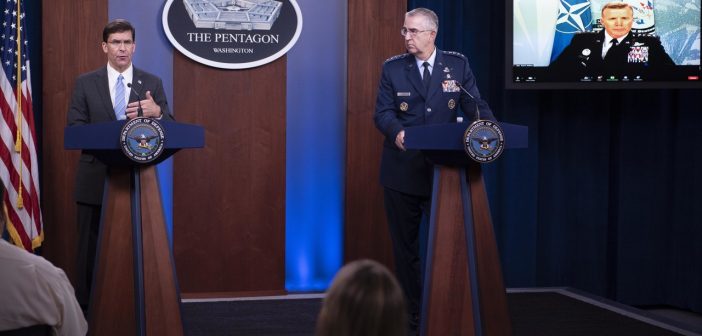Updated on Aug. 1, 2020, at 1240 EDT
In announcing that America will cut 12,000 troops from Germany, Defense Secretary Mark Esper said the move would strengthen NATO, help allies and better deter Russia.
Sadly, the move do the opposite — hurt NATO, undermine America’s global reputation, help Russia by reducing US troops in Germany by a third and stoking discord among key alliance members, and waste time and money.
Esper said 6,400 troops would come home, while 5,600 others would move around Europe as US European Command headquarters — with 2,000 personnel — shifts from Germany to Belgium and other forces relocate. One fighter squadron would head to Italy as a new home is sought for US Africa Command, now in Stuttgart. US troops could also be moved to Poland, Bulgaria and Romania.
The decision wasn’t the product of deliberative strategy, but to implement Trump’s petty decision to punish Germany for not spending 2 percent of gross domestic product on defense — and make it sound strategic. Anyone arguing otherwise gravely undermines their credibility and insults our collective intelligence.
Esper said the move would start soon, span years and cost billions DoD doesn’t have. Given that every single posture review is about saving money, it’s unclear why the Pentagon endorsed moves that will cost more money — even if it’s single digit billions.
This would be a funny parable of what happens when a mad king with a devoted court makes a impetuous decision — if it wasn’t true or serious.
When NATO’s largest member and leader turns on one of its NATO allies in such a public and punitive way, the only beneficiary is Russia. This really isn’t hard.
The decision itself, and the unilateral and uncollaborative way it was made, only accelerates the world’s diminishing respect for America as a responsible global leader and reliable partner, while further eroding Washington’s influence with Germany, a nation strategically vital whether engaging with Europe or countering China and Russia.
And in the wake of Britain’s chaotic exit from the European Union, Germany will become an increasingly important US security partner. For decades, Britain — as a key NATO member with a special US relationship that also was an EU leader — helped amplify Washington’s voice in European affairs. That unique and important role ended on Jan. 31 when Britain left the EU. It’s now imperative Washington engage more closely with nations that belong to NATO and the EU as it expands its security role. It’s worth noting that Washington’s decision comes as Germany assumes the six-month, rotating EU presidency.
As the world’s No. 4 economy, Germany is a critical partner at a critical time. Seventy-five years after the end of World War II, Germany is increasingly finding its rightful voice and role as a global power, whether in pushing back on Beijing’s atrocious international behavior and absurd territorial claims to, more recently, mediating spiking tensions between Greece and Turkey.
Since taking office, Trump has fixated on both how much allies spend and how much they pay to cover the cost of US troops on their soil. It is a fixation — that combined with a sense of threat from Russia — that has spurred NATO members to boost spending. But that’s not the only measure of an ally’s merit and the administration’s myopic drive for more money or basing support threatens to derail relations with key allies beyond Germany like Japan and South Korea.
The administration’s message to allies is to spend more on defense to buy more US weapons and cover even more troop basing costs, and make trade concessions otherwise Washington won’t abide by its security commitments. Allies are spending more and buying more US weapons, but that’s in part to placate Washington and hedge their bets that America might not be there for them in a crisis. It is a deeply flawed and short-term approach.
All nations resent being bullied and the world notices when the one doing the bullying is the United States. These actions speak loudly, undermining Washington’s case against other bullies threatening the international order, like China and Russia.
As for Germany, Berlin has long covered part of cost of hosting US troops on its soil, forces that regularly deploy alliance-wide for training and reassurance operations. Returning those troops means more military construction spending at home — funds already raided to cover the president’s border wall. Deploying forces from America to Europe costs more than from Germany to Estonia.
While adversaries will be buoyed that there are no brakes between Trump’s capricious decisions and their execution, allies will find reason for confusion.
If Berlin is being punished for not spending enough, why would Washington remove its troops from Germany, which spends 1.3 percent of GDP to Belgium and Italy that both spend less in GDP terms?
Germany has dramatically increased spending since 2014 as consensus builds that Berlin must do more for its own security, spurred by concern that it can no longer rely on America to abide its mutual defense obligations. It is a wealthy nation that can and should spend more on its security.
That said, the 2 percent of GDP target by 2024 was a bumper sticker to ensure the alliance agreed to do something meaningful at the Newport Summit in the wake of Russia’s Ukraine invasion.
But unlike the United States, it is fiscally responsible and works hard to ensure other national needs — from universal healthcare, education, infrastructure, and technology investment — are also covered without increasing its debt burden. It’s easy to spend 3.2 percent of GDP on defense when you’re borrowing $1 trillion a year to do so.
And Berlin doesn’t get enough credit for the extraordinary investment it continues to make across the former Warsaw Pact that turned authoritarian communist states into — by and large — free market democracies. It is also investing in the new infrastructure NATO needs — like better ports, roads, bridges and rail lines — to move troops, equipment and supplies during wartime. It’s spending that’s as critical as buying more planes, ships and tanks. And it has consistently made its troops available for NATO and global mission, with 1,100 still in Afghanistan.
The administration’s defenders argue that irrespective of Trump’s rationale, the decision offers opportunity to make overdue changes.
Relocating US European Command to Mons alongside Supreme Headquarters Allied Powers Europe makes sense, they say, and would speed decision making and keeping senior leaders and staff from shutting between the two headquarters.
And Poland, the Baltics, Bulgaria or Romania all deserve a bigger US troop presence as nations on the front lines of the alliance, supporters add.
While relocating the headquarters could make sense and there’s no doubt there should be a bigger alliance presence across the region — the question is at what cost and whether it will improve the alliance’s ability to deter Russia and counter its nefarious agenda.
Relocating headquarters are always more expensive and disruptive than expected as expert personnel often decide against moving.
As for shifting troops, Washington hasn’t finalized security agreements with Poland, Bulgaria or Romania, there’s the NATO-Russia Founding Act to consider, and it’s unclear whether a few thousand more troops in any of these nations will improve deterrence not already afforded to all NATO members.
In each nation, it makes more sense to rotate forces forward from Germany than it does from the United States. That’s why cutting US troops in Germany hurts security across the region. Permanently basing troops in each means getting ready for further provocations from Russia given its expertise as a hybrid player.
Finally, the notion that this move is about being tough on Russia is disingenuous. During its tenure, the administration hasn’t been as tough on Russia for its many transgressions as necessary, whether targeted killings, its tampering with the 2016 US election and continued disinformation operations in America and across Europe. What toughness there’s been was forced by Congress.
Consider that when Trump spoke with the Russian President Vladimir Putin just last week, he failed to discuss allegations that Moscow had placed bounties on American troops in Afghanistan. In fact, Trump still wants to Russia back in the G7, membership it lost after illegally invading and annexing Ukrainian territory.
The hope that good people across the national security enterprise would impede the president’s whims failed to consider that the system is engineered and conditioned to execute his directives — whether they make sense or his subordinates agree with them. They voice their views but are obedient to the chain of command, but ultimately salute and find upside where they can.
And the sheer volume of the administration’s missteps makes it difficult to check them.
In this case, Congress must stop the Pentagon from moving anything, anywhere by blocking the administration from using a single cent to execute a plan that will result in lasting damage to America’s relationship with Germany and NATO, as well as its reputation as a reliable ally worldwide.
It also constitutes an unnecessary and expensive distraction from the task at hand — deterring an increasingly assertive China and a perennially subversive Russia on far less money in the wake of the mismanaged coronavirus crisis. Success depends on America focusing its increasingly limited resources on delivering needed capabilities rather than implementing the president’s costly vendettas and reinvigorating its alliances, not dividing its allies.




